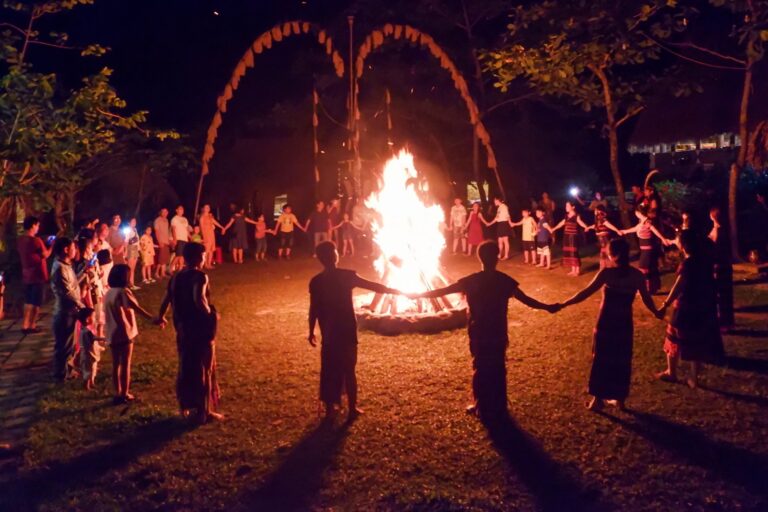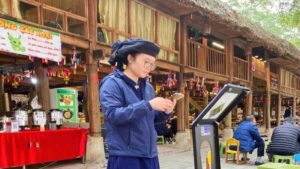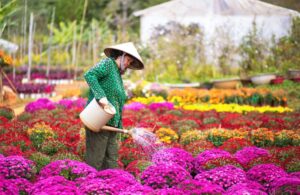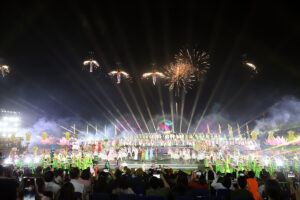The Mekong Delta's famed floating markets, where local speciality produce is sold on boats, provide a unique scene that draws both local and foreign visitors.
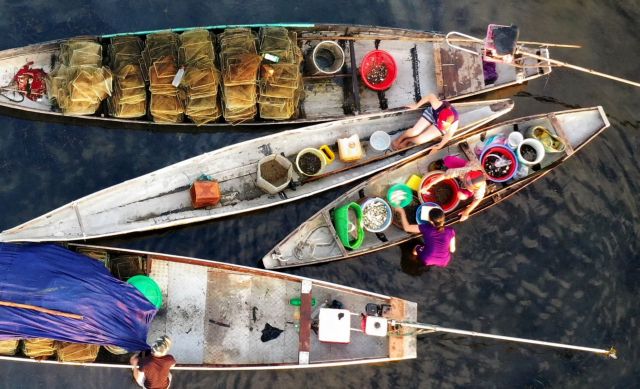
Traders purchase and sell fish at the Quang Loi lagoon's Ngu My Thanh floating market. VNA/VNS Photo Ho Cau
Researchers say that the floating markets were established to meet local goods distribution and consumption needs in the area where road traffic is less developed.
In addition, the markets also illustrate the southerners' custom of buying, selling and travelling on the river.
Nham Hung, a cultural researcher, said that floating markets represented the cultural features, tourism specialties, and the pride of the land and people of the Mekong Delta.
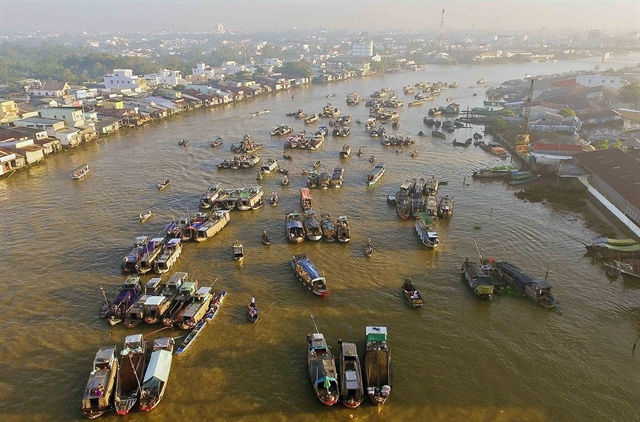
Cai Rang floating market (Can Tho City) was voted as one of the 10 most impressive markets in the world by the British travel magazine 'Rough Guide'. VMA/VNS Photo An Hieu
Among the floating marketplaces in the delta, Cai Be in Tien Giang Province and Cai Rang in Can Tho City are the most popular sites for visitors to the southwest region.
According to a poll conducted by Can Tho's Department of Culture, Sports, and Tourism, the floating market is a must-see attraction for more than 70 per cent of visitors to the city.
Le Thanh Phong, vice chairman of the Mekong Delta Tourism Association, has been to many floating markets worldwide and has observed the distinct appeal of Cai Rang, a typical floating market of the Mekong Delta.
Phong has noticed that the trading in this market is not only a reenactment or performance for visitors but also the locals' actual lives. The market demonstrates the delta inhabitants' authentic and vibrant cultural character, intriguing tourists.
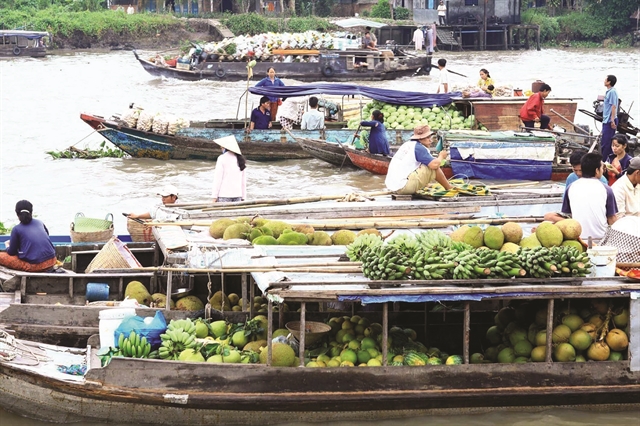
Ba Ngan floating market in Nga Bay town, Hau Giang Province, features a wide variety of fruit and other local delicacies. VNA/VNS Photo Duy KhuongFrequent visitor to the Cai Rang floating market Dang Thu Hien was charmed by the local cuisine and culture.
"Listening to the lively sounds on the river in the early morning while enjoying a bowl of hot hu tieu (noodle soup), a cup of ba ba sweet soup, and grilled banana cakes is an amazing experience," she said.
"By visiting the highland markets in the Northwest and the floating markets of the Mekong River Delta, I learned more about the lives, customs, and habits of the people in each region."
Culture preservation and tourism
Floating marketplaces in the Mekong Delta continue to exist, playing a part in economic activity and serving as a tourist draw despite numerous changes and the diversification of purchasing, selling, and exchanging commodities over time.
However, many experts, management organisations, and businesses are concerned with how to sustainably protect and enhance the value of the floating markets, while expanding tourist experiences.

Foreign tourists taste pineapple, a signature fruit of floating markets. VNA/VNS Photo An Hieu
Associate Professor Dao Ngoc Canh of Can Tho University said he believed that while tourism resources are vital, they are merely the “raw materials” for making high-quality products.
“Without a skilled chef, it is impossible to prepare a delectable dinner, even if the ingredients are great, likewise for tourism. Based on understanding the needs and preferences of tourists, appealing and competitive tourism products must be developed via investment and inventiveness,” he said.
Taking the example of the Cai Rang floating market, Canh said that it was established in the early 20th century and had since become one of the most well-known floating marketplaces in the world.
However, Canh argued that floating market tourism services and products must be continuously enhanced to match social development and satisfy tourists.
“If floating market tourism is merely exploited without investment, it will eventually become monotonous,” he said.
He suggested establishing a floating market tourist service centre with the functions of inspecting and supervising tourism services, ensuring civilised tourism business, ensuring security, and organising tours connecting the Cai Rang floating market with nearby tourist attractions.
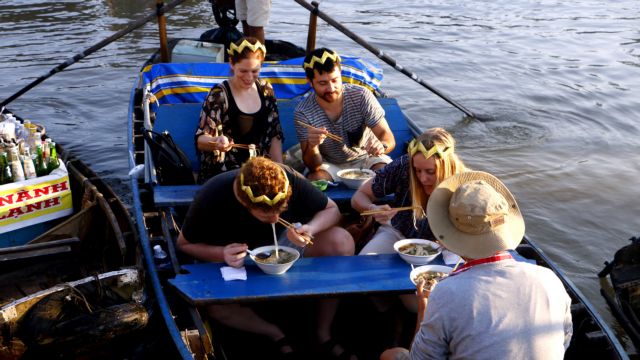
Tourists enjoy their breakfast of hu tieu (noodle soup), a famous dish at the Cai Rang floating market. VNA/VNS Photo Thanh Liem
Canh also said that for floating market tourism products to become increasingly diverse, it was necessary to develop all types of services to sell speciality produce and souvenirs on land and retail boats, thereby providing customers with a selection from which to choose.
The establishment of a supply chain for floating market tourism products, mainly fruit, food, and souvenirs was also needed.
In addition, it is necessary to encourage locals to participate more in tourism services, such as taking tourists to the floating market by boat and selling fruit, food, beverages, and local delicacies.
“These services must be supervised and invested in properly,” he said.
Tran Thi Bich Thuy from the National Institute of Culture and Arts in HCM City said that floating markets in the Mekong Delta played a vital role in the economic, cultural, and social life of southern residents.
She added that the country's development required the transformation of the floating market for it to continue to exist and develop while preserving traditional culture.
Thuy suggested that some typical floating markets be selected, combined with craft villages and restaurants, to form a complex that is both an eco-tourism destination and an area to explore and enjoy Southern cuisine.
She added that the local authorities needed to strengthen communication and raise community awareness about tourism development associated with the conservation and promotion of cultural heritage.
"It is important to realise that cultural heritage is the foundation for promoting sustainable tourism development while creating favourable resources for the conservation and promotion of heritage, including the floating market's cultural heritage," she said.
With the right vision and management, the spectacular floating markets in the Mekong Delta will provide a place for locals to earn income and a unique tourist experience for many decades to come.



